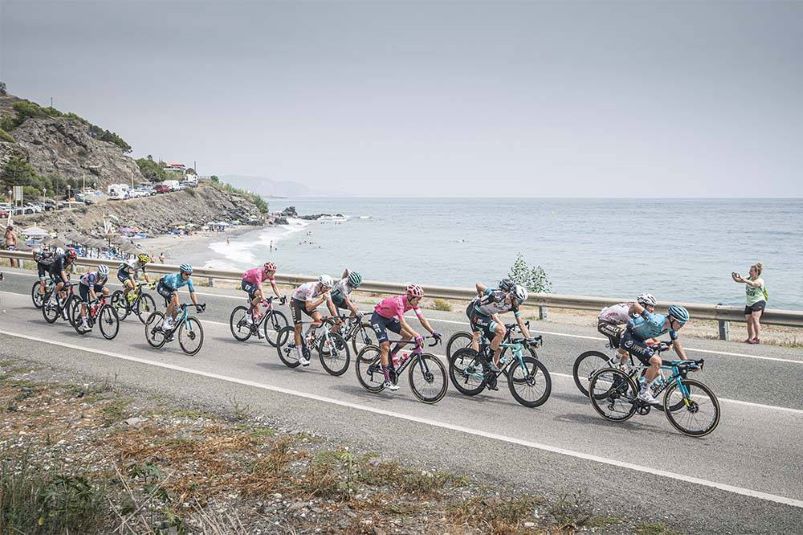 Just a few weeks before the 2024 UCI Women’s WorldTour and UCI WorldTour get underway in Australia with the Santos Tour Down Under (12 January for the women and four days later for the men), the Union Cycliste Internationale (UCI) provides an update on measures to protect riders’ health for the upcoming season.
Just a few weeks before the 2024 UCI Women’s WorldTour and UCI WorldTour get underway in Australia with the Santos Tour Down Under (12 January for the women and four days later for the men), the Union Cycliste Internationale (UCI) provides an update on measures to protect riders’ health for the upcoming season.
The newest element among the UCI’s safety measures is a protocol to be introduced in the first part of the season, after finalisation and approval, to deal with high temperatures at road races. This will be in addition to the Extreme Weather Protocol, introduced by the UCI in 2015, which covers all adverse weather conditions, not just those associated with high temperatures. In view of the climate changes that the world has been facing in recent years, the UCI wishes to better define the optimal conditions for organising road races in hot climates, with a new High Temperature Protocol.
The components of this protocol will remain the same as those of the existing Extreme Weather Protocol: when conditions at an event necessitate, a working group will be convened by the President of the Commissaires Panel at the request of the UCI, the teams, the riders or the organisers, to agree on an action plan to mitigate the risks to riders’ health and safety.
The aims of the new High Temperature Protocol are to provide a practical and easy-to-use objective assessment of the environment – based on temperature and relative humidity data published in real time by weather stations – and to propose measures to be taken by organisers and teams to reduce the risk of heat-related accidents. Such recommendations could be, for example, moving start zones to shaded areas, supplying teams with cold drinks and crushed ice during the race, increasing the number of refueling motorbikes, altering the start time or potentially neutralising sections of the race. It should be understood that these measures will only be recommendations, depending on the severity of the climatic conditions, and their application will remain the responsibility of the working group.
The UCI’s Medical Director Professor Xavier Bigard presented the protocol to cycling stakeholders at the UCI Women’s WorldTour and UCI WorldTour Seminar in Lausanne, Switzerland, last week. It will now be submitted to the UCI Management Committee for approval at its next meeting, to be held in Prague, Czechia, from 31 January to 2 February 2024.
Also with a view to the new road season, the UCI issues a reminder that the UCI’s Tramadol Programme will come to an end on 31 December 2023 due to the introduction of the World Anti-Doping Agency’s (WADA) ban on the substance in competition from 1 January 2024. The presence of tramadol in riders’ bodies will therefore be investigated as part of the anti-doping programme implemented in cycling by the International Testing Agency (ITA).
It should be remembered that this substance has been banned from cycling competitions since March 2019 for medical reasons (risk of drowsiness and addiction), and not because it improves performance. Noteworthy elements from the UCI’s testing programme – based on the analysis of dried blood spots using a scientifically validated method – include the following:
- nearly 2200 tests were carried out at the finish of road races;
- three cases of use of this substance were identified, all of which were first offences and resulted in disqualification from the event in question and a fine;
- the prevalence of tramadol use in cycling fell from between 4% and 6% before March 2019, to between 0.2% and 0.5% after that date.
Still on the topic of rider safety, the UCI stresses the importance of the Concussion Protocol. Concussion is a brain injury that needs to be detected, diagnosed and treated to ensure full recovery of the brain functions affected.
Although a protocol validated by international scientific bodies already existed for the rapid diagnosis of concussion, the UCI adapted and transposed the protocol so it could reply to the specificities of cycling’s different disciplines, including road cycling.
While the diagnosis of concussion remains a medical matter, the detection of the first signs of concussion concerns all those involved in cycling who are not health professionals (team members, mechanics, Commissaires, officials, the riders themselves, etc.). The UCI has developed recognition tools for this purpose, which are available to everyone by means of a simple QR code.
It is an obligation to declare any case of concussion to the UCI Medical Department, and to declare any return to competition of the rider concerned, using the documents available on the UCI website.
Another health protocol, which at this stage has been judged no longer necessary for the 2024 season, is that relating to the COVID-19 pandemic. The COVID-19 Protocol was introduced by the UCI in June 2020 for the prevention of infections by the virus responsible for COVID-19. This protocol, which has since been regularly adapted in line with the state of the pandemic, enabled road races to resume rapidly at the height of the pandemic.
The virus is still circulating today, and with the winter season, there has been a slight resumption of the epidemic. Thanks to extensive vaccination campaigns, however, forms of the disease remain relatively mild, including in susceptible individuals.
Wearing a mask, hand hygiene and ventilating enclosed spaces – all effective measures during a pandemic – are still relevant. People who test positive are no longer obliged to isolate, but the continuation of barrier measures remains essential. These are the responsibility of team doctors as part of standard prevention against respiratory infectious diseases.
UCI President David Lappartient said: “The health, safety and wellbeing of our cyclists are of the utmost importance. That is why the UCI is continually working to respond to new situations and adapt its protocols in line with the changing environment in which cyclists evolve. I am delighted by the work that the UCI, led by Professor Xavier Bigard, has carried out to establish a High-Temperature Protocol, and I also encourage all cycling stakeholders to familiarise themselves with the Concussion Protocol. When it comes to the use of tramadol, I am extremely satisfied with the work that the UCI has carried out to rid this from cycling and welcome WADA’s ban on this substance from the beginning of next year.” – www.uci.org


































